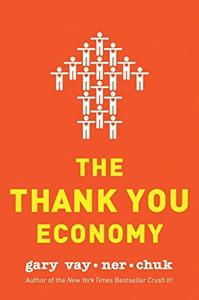
Want to learn the ideas in The Thank You Economy better than ever? Read the world’s #1 book summary of The Thank You Economy by Gary Vaynerchuk here.
Read a brief 1-Page Summary or watch video summaries curated by our expert team. Note: this book guide is not affiliated with or endorsed by the publisher or author, and we always encourage you to purchase and read the full book.
Video Summaries of The Thank You Economy
We’ve scoured the Internet for the very best videos on The Thank You Economy, from high-quality videos summaries to interviews or commentary by Gary Vaynerchuk.
1-Page Summary of The Thank You Economy
Overview
Gary Vaynerchuk’s Crush It! is a motivational text and guide for those who want to turn their passion into a business. The book details how anyone can “crush it,” i.e., live their passion, make money off of what they love to do, and determine their livelihood.
Businesses are now facing more competition than ever before. They have to compete on a much larger scale because of the internet, which has made it easier for businesses to reach out to customers around the world.
Today, businesses need to look beyond traditional forms of marketing and advertising. The Thank You Economy explains how you can use social media and other online tools to connect with customers in a personal way. It’s modeled on the “good old days” when companies took care of their customers directly instead of using impersonal methods like mass-marketing campaigns.
Social networking has changed the way we do business and engage with others. To succeed in this new reality, a whole new approach is necessary to cope with these changes.
In this article, you will learn how multinational companies need to think like small town butchers and interact with customers in a personal way. The author of the article decided to switch deodorant brands because he was sick of being marketed to by big corporations. You can say goodbye to your business if you don’t use social media as it’s an essential communication tool for modern businesses.
Big Idea #1: Social media is bringing back values that were once popular in business.
Have you ever heard your grandparents talk about how businesses were courteous when they were young? Do you think it’s a myth, or do you believe that it happened? Because of the way business is now, courtesy has disappeared.
In the past, local shop owners had to take care of their customers because it’s hard to find new ones. If, for example, a butcher made one customer angry by not giving him enough meat or charging extra money for something he didn’t need, that customer would tell his neighbors and soon the butcher would have no more customers.
Butchers used to be important in the past because they were your only source for meat. You had to go back to them again and again, so you needed a good relationship with them. That’s why they tried hard to give good service because that would make people want to come back. But as cities got bigger, there was more competition between butchers, so it didn’t matter whether or not you liked one butcher; there would always be another one around the corner if you didn’t like him.
However, social media has brought back some of the old ways.
Online networking sites, such as blogs and Twitter, are great tools for sharing thoughts with the world. If someone is unhappy with your service or product, they can tell everyone about it very quickly. For example, a customer was upset because AT&T wasn’t providing good service to him. He wrote an email to the CEO of AT&T telling him his experiences. Instead of sympathy from the company’s CEO, he received a legal threat! This story got shared on social media by many people who were angry at how poorly this customer was treated by AT&T’s CEO.
Companies must learn to be courteous like the companies of old, otherwise they will not survive in today’s world.
Big Idea #2: Trust is important to businesses. In order to be successful, they have to build trust with their customers.
With so much competition in the market, it’s not enough to have a good product or service. Your customers will always find someone who offers your services cheaper, better and faster than you do.





